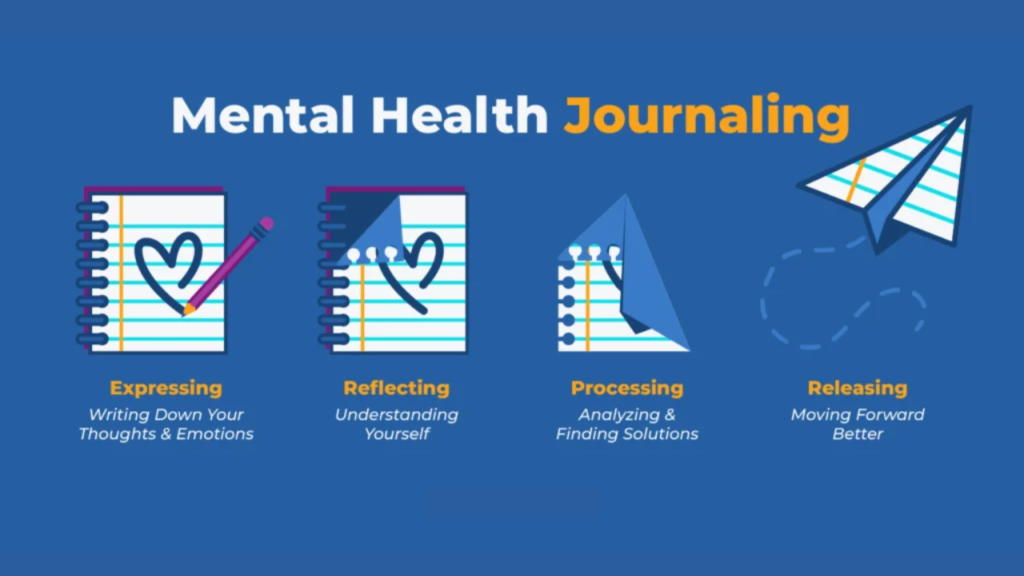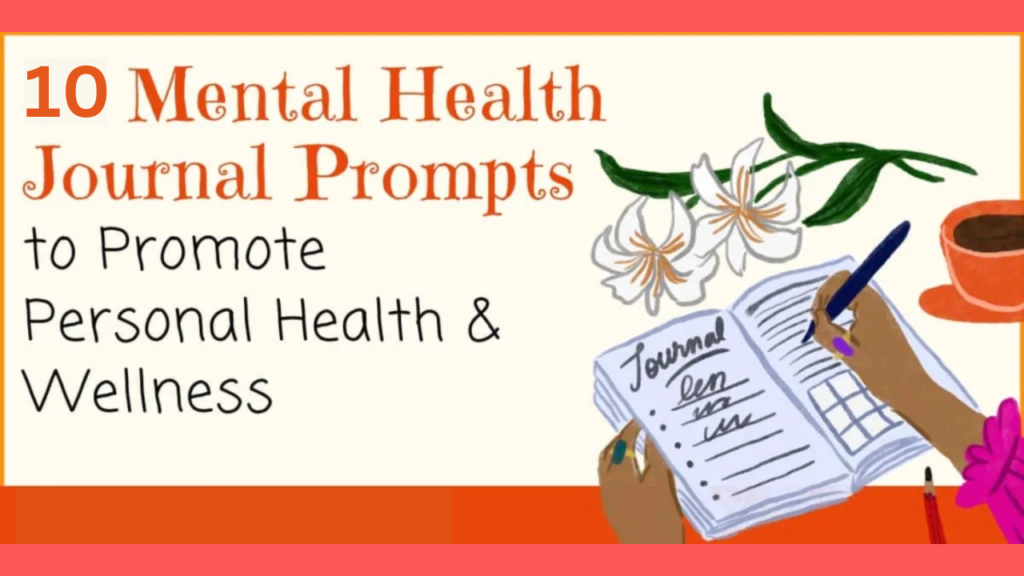
Journal writing is a popular way for people to share their feelings and thoughts without worrying about being judged. You can write in a journal about anything you need to work through, like the new promotion at work or a tough talk with your mom.
Turning your thoughts into real words can help you spot patterns and find solutions to challenges in your life that might be holding you back. Journaling offers a safe place to explore big ideas and emotions that might feel too much until you write them down. In this article, I will share some helpful journal prompts for mental health. So, let’s get started.
Why Should You Use Journal Prompts for Mental Health?

Prompts can make it easier to begin your journal entry by overcoming the initial challenges. They provide direction and help you explore your experiences, feelings, and thoughts more deeply.
For those journaling for mental health, prompts keep the process focused and productive, resulting in personal growth and valuable insights. They turn journaling into a guided journey through your inner self, making the practice more accessible and fulfilling.
Advantages of Journal Prompts for Mental Health

Although it might appear simple, journaling for mental health can help calm both your body and mind. Writing down your deepest feelings and thoughts in a diary or journal offers several proven benefits. These include reduced symptoms of mental illness, lower blood pressure, and better lung and heart function.
Let’s explore six key advantages of journaling prompts for mental health:
Improves Communication
In intense moments, it can be challenging to express your feelings clearly. Writing down these emotions allows you to reflect on your feelings and articulate them better, making it easier to explain yourself to others without stumbling over your words. This process can strengthen your relationships and help combat feelings of loneliness.
Helps You Process Emotions
Events and experiences can sometimes leave you with a tangled mess of emotions. When you keep these feelings bottled up, they can resurface and lead to bigger issues. Practicing daily journal prompts for mental health acts as a release valve, providing a safe space to express those emotions. A study found that naming your feelings can lessen their impact and make them easier to handle.
Aids in Managing Mental Health Challenges
- Trauma: Expressive journaling can serve as a helpful coping tool for survivors of trauma or people experiencing signs of post-traumatic stress disorder (PTSD). Writing can aid in managing emotions, reducing feelings of anger and anxiety, as well as easing physical symptoms such as muscle tension. In addition, journaling can encourage post-traumatic growth by helping you create a narrative around a traumatic experience and discover its meaning.
- Depression: Studies from the International Journal of Depression and Anxiety indicate that practicing gratitude can help individuals with depression handle their symptoms effectively. Keeping a gratitude journal when you are depressed can assist you in overcoming feelings of sadness and shifting your outlook to a more positive perspective.
- Stress: Journaling regularly can help lessen the effects of stressful situations, reducing the risk of chronic anxiety and burnout. It offers a way to release negative emotions, much like attending a therapy session or having a conversation with friends. In addition, keeping a journal can encourage you to seek social support, which research shows can strengthen mental resilience and improve healing.
- Anxiety: Research indicates that journaling for just 15 minutes per day, three times each week, can greatly reduce feelings of severe anxiety and mental distress. This practice allows you to process your worries and discover a path forward.
Assists Mindfulness
Focusing inward while journaling helps you connect with your emotions and pay attention to your inner self. Practicing mindfulness in this way can assist you in:
- Better management of stress
- Improving your focus and concentration
- Bringing your goals to reality
- Enhancing your cognitive flexibility
- Breaking the cycle of overthinking
Provides Perspective and Clarity
Journaling creates a space between yourself and your imagination, allowing you to look at them more objectively before accepting them as reality. This distance, known as cognitive defusion, helps you assess the situation that triggered those emotions, determine your next steps, and build a way forward. It’s not about ignoring your feelings but rather finding the strength to step back from negative self-talk and inspect the facts more clearly.
Supports Self-care
Journaling is an important self-care activity, and adding self-care to your regular routine can help you handle stress more effectively, increase your energy levels, and boost your physical health. These things are particularly crucial during tough times. Journaling can be the initial step in creating self-care routines that help you feel secure and satisfied.
Top 10 Journal Prompts for Mental Health

Journaling is a popular self-care practice for your mental health because it offers a secure space for expressing emotions, encouraging self-reflection, and helping individuals track their personal growth. While it shouldn’t replace professional mental health treatment, journal prompts for mental health are frequently used as a helpful tool in therapy.
It can also assist in managing mental health signs, such as anxiety. Below are 10 daily journaling prompts for mental health:
- Can you describe a time when you conquered self-doubt?
How did overcoming this challenge impact your self-trust? How did you feel afterward? If you haven’t yet conquered self-doubt, what steps would you like to take in the future to achieve this?
- Write down 10 things, whether big or small, that bring happiness to your life
Every answer is valid here. Your list does not need to be fancy. It might be eating a doughnut and drinking a cup of tea. It could be reading a good book and a chat with your mom. Whatever brings you happiness, write it down.
- What does your perfect self-care routine look like?
In what ways does your self-care routine improve your mental well-being? Feel free to take your time and share as many details as you wish. If you haven’t established a self-care routine yet, imagine the activities you would like to explore.
- What traits do you think a person with strong mental health has?
What steps would you take to boost your mental health? When you picture someone with excellent mental well-being, what traits do they have that you might want to adopt?
- How do you deal with stress?
What coping methods do you rely on? Which ones are effective for you, and which ones might not work as well?
- Compose a letter to a loved one who has passed away
Highlight the positive impact this individual had on your life. It could be a dear friend or a cherished family member. Simply listing the qualities you admire about them can be uplifting.
- Can you recall a time when you overcame a difficult situation?
What lessons did you take away from that experience? What actions would you repeat, and what might you change? Reflecting on these questions can help you identify your strengths during tough times and highlight areas that may need more focus.
- Is there a secret dream or hope for your future that you’ve kept to yourself?
You don’t have to be practical right now. Let yourself feel happy and excited about your dreams and hopes.
- In what ways has your support network helped you tackle obstacles?
What do you appreciate most about the way people in your life help you when things get difficult?
- Draft a plan for your dreams
List the steps you could take to reach your dreams. These steps can be small or big. Putting your goals and the path to achieve them on paper can make them feel more realistic and easier to start working on.
Closing Remarks on Journal Prompts for Mental Health
Journaling gives a glimpse into an individual’s mind beyond the therapy sessions. By breaking down and thinking about their experiences, people can find clarity and create better ways to handle problems. Writing in a journal goes beyond just keeping a record; it acts like a mirror, showing your deepest feelings, thoughts, dreams, and fears.
This reflection helps people celebrate successes, face past traumas, see patterns, and, most importantly, understand themselves deeply. Journal prompts for mental health push us to ask questions, challenge ourselves, and dream big.
By regularly exploring our inner stories, we not only grow in emotional strength and self-awareness but also find a sense of direction and purpose. In this case, the pen turns into a strong tool, not only for noting down life events but also for shaping our lives.
